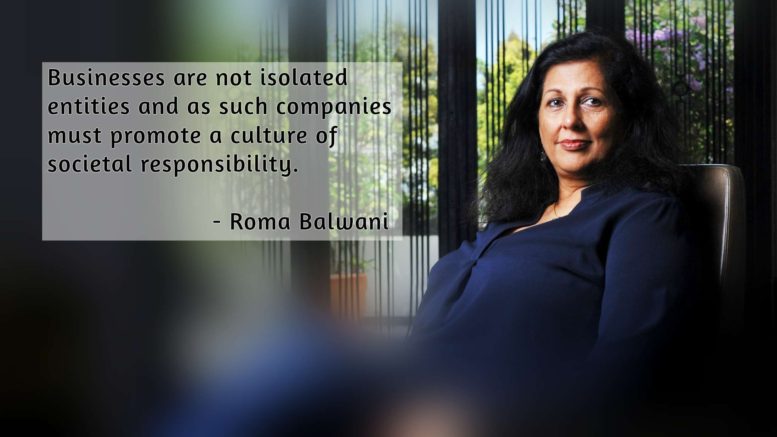The force behind driving sustainability, corporate social responsibility and communications as a strategic function at Vedanta, Roma Balwani, President, Group Communications & Sustainable Development believes businesses are not “isolated entities” and that companies must promote a culture of societal responsibility, as it’s absolutely crucial that every enterprise must introspect on how its existence brings about a net positive impact to the society. She gets into a chat mode with Shree Lahiri, as she explains how one must have a holistic approach and a long term vision.
RT: How do organisations need to embrace CSR (Corporate Social Responsibility) as a business imperative? The emphasis mostly was on how there are business needs to adopt CSR, but it is high time they became socially conscious. Please comment.
Ans: Businesses are not isolated entities. They can thrive with the support of their host communities, whose growth is imperative to sustain the development of the businesses. It is absolutely crucial that every enterprise must introspect on how its existence brings about a net positive impact to the society.
Although nascent, businesses are increasingly getting exposed to the idea that community development initiatives are hardly about commercial transaction. Legislation, as we have witnessed in the case of the Companies Act (2013), is only a precursor for
organisations to begin such initiatives. There are a host of financial or material benefits that CSR generates for the businesses executing them. If one puts financial rewards against social rewards while judging or assessing a CSR strategy, I am afraid the outcome will be lopsided. What one can however argue for is the method of incentivisation. Also, adopting a CSR initiative that is in some way aligned to the core competency of the firm may add value to the company’s triple bottom-line, if they have the requisite products and services. Companies must promote a culture of societal responsibility, which will eventually build a sense of purpose and motivation among the employees. Instead of CSR & Sustainability personnel working in silos, entire organisations must be galvanised to enable development
change.
RT: What is your impression of the CSR scenario in the country today? Do you see a difference in the Indian picture vis-à-vis internationally?
Ans: The idea of contributing to the society in India goes back a long way. What began as philanthropy with the first school of entrepreneurs in British India, evolved into the idea of trusteeship during the last years of British rule and subsequent years post the Independence. This idea of trusteeship eventually gave way to the socialist economy, wherein Public Sector Undertakings (PSUs) dominated the area.
Post the liberalisation in 1990s we have seen a rapid transformation in the manner in which private enterprises engage with communities to leverage community initiatives. As global issues such as labour welfare, poverty eradication, environmental sustainability and climate change gain more traction in India, organisations are increasingly adopting their CSR strategies to address them.
One aspect which companies in India must begin to focus on more closely is that of adopting international benchmarks. Compliance with international standards will enable comparative measurement and enhance the credibility of companies globally. Vedanta for instance, has adopted a range of global benchmarks right across its environmental sustainability and CSR initiatives. We aim to maintain an ongoing, transparent dialogue with all of our stakeholders in order to build the strong relationships that will allow our business to succeed and to preserve our social license to operate.
RT: What are the areas Vedanta is focusing on as far as CSR activities go?
Ans: It is crucial that we, as an organisation maintain an ongoing, transparent dialogue with all of our stakeholders in order to build the strong relationships that will allow our business to maintain harmony and create new opportunities for the local population.
Most of our operations are in remote areas that are home to indigenous communities. Local communities have the right to participate in the decision making and we respect the principle of free, prior informed consent.
Human rights remain an important issue to us. Addressing poverty, inequality in all forms, women empowerment, child nutrition and skills development to increase employability remain some of our top focuses as far as our CSR activities are concerned. In 2015 we became a signatory of the ‘CEO Statement of Support’ for the United Nations’ Women’s Empowerment Principles (WEP), ‘Equality Means Business’.
RT: Vedanta won Four Awards at IndiaCSR in April 2015. How was the feeling on this achievement? Have any more awards followed?
Ans: While it is an honor and indeed humbling to have received this recognition, we at Vedanta strongly believe that this will be a continuous journey to make a positive impact on communities. The CSR teams at Vedanta work closely with their partners, be it the government, or the NGOs or the community members to achieve the outcomes which are desired for that particular community. We have always believed in our Chairman, Mr. Anil Agarwal’s vision and passion to see the change in India in terms of poverty alleviation, job creation and women empowerment, which are the fundamentals which guide and motivate our teams to do good work on ground.
RT: What else can organisations do in this area, which you feel have been neglected so far?
Ans: There has to be a mindset change where we look as integrating the marginalised communities with the development of the society of which they should be a part of. They also have the right to basic amenities, good education for their children and given an opportunity to bring a positive change in their lives.
One of the areas where I believe companies in India must focus on is that of developing newer, frugal technologies that rely on non-conventional energy sources as well as self-regulatory mechanisms that help in creating inter-generational equity.
Companies should shift away from the current, exploitative economic model of growth, to one that recognises the need to protect all its stakeholders. This is a narrative of India as a developing nation which needs to be heard as well as addressed in a way that brings in the shared value proposition as propagated by Micheal Porter where in you bring in social change that ultimately benefits the society at large and creates new lifestyles and opportunities of growth that never existed before.
As we have progressed from the Millennium Development Goals and as we study the Sustainable Development Goals and bring them into our way of conducting business and implementing social measures, these will have long lasting impact and outcomes for society.







Be the first to comment on "Communicator Speak – Roma Balwani"